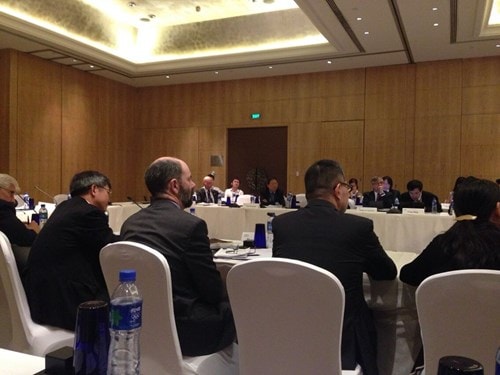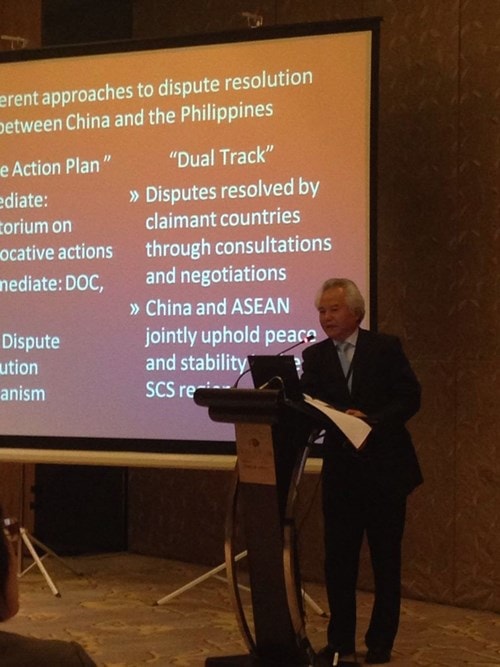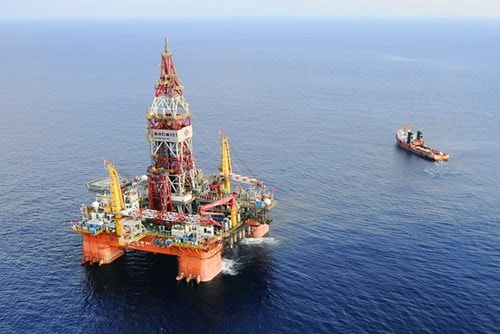China unexpectedly organizes international conference on East Sea arbitration case
The workshop had the participation of more than 40 experts and scholars, focusing on discussing issues related to the Philippines' lawsuit against China.
 |
| “International Research Workshop on China-Philippines South China Sea Arbitration” |
On August 21, in Beijing, the China Institute for South China Sea Studies and the China South China Sea Joint Innovation Center co-organized the "China-Philippines South China Sea Arbitration International Research Seminar".
There are more than 40 experts and scholars from countries, regions and international organizations such as China, Taiwan, UK, Canada, Australia, South Korea, Singapore and the International Tribunal for the Law of the Sea.
This time, the conference took place over two days, and the conference discussed in depth many topics (made up to direct public opinion in a direction favorable to China - reporter) such as "Origin and development of the East Sea dispute", "Jurisdiction and the issue of admissibility of the China-Philippines East Sea arbitration case", "Legal basis for China not to participate in arbitration in the dispute settlement mechanism of the United Nations Convention on the Law of the Sea", "The East Sea dotted line and China's territorial claims and maritime rights", "Legal status of islands and reefs", "The Philippines' claims to rights in the East Sea and China's (illegal) law enforcement activities to protect maritime sovereignty", "The role of international justice in resolving international disputes" and "The impact of the East Sea arbitration case".
Director Wu Shicun, China Institute for South China Sea Studies, delivered a keynote speech at the opening ceremony. According to Wu Shicun, the “South China Sea dispute” (caused by China’s invasion and provocation) has existed for a long time, the current situation is very complicated and sensitive, and the dispute cannot be completely resolved in the short term.
Ngo Si Ton predicted: “History tells us that it may take several decades, even hundreds of years, to resolve disputes related to territorial sovereignty and maritime management rights.
Moreover, the East Sea dispute involves 6 countries and 7 parties (China, Philippines, Vietnam, Malaysia, Indonesia, Brunei and Taiwan), the parties' policies and interests overlap.
 |
| Wu Shicun, Director of the Institute for South China Sea Studies, China |
Mr. Ton believes that the parties in the East Sea need to increase dialogue (how has China actually conducted dialogue? What China has done in recent times reflects what Beijing has always said? - reporter), exchange, seek and expand consensus, strengthen trust through cooperation, and at the same time explain and properly apply rights under the "United Nations Convention on the Law of the Sea", and be willing to fulfill obligations, "not doing things that expand and complicate disputes in the East Sea".
Currently, the East Sea dispute is tending to be internationalized and judicialized, geopolitical competition and arms race are constantly getting worse, “very unfavorable” for (China) to manage, control (illegally) and “resolve the East Sea dispute”. Therefore, building an effective mechanism to manage, control crises and resolve disputes is very important for peace and stability in the East Sea region and the entire Asia-Pacific region.
Regarding this issue, Mr. Ngo Si Ton made 3 suggestions on how to protect peace and stability in the East Sea region before finally resolving the dispute. I would like to quote them for readers and analysts to refer to and see what China is "prioritizing" but still cannot hide its greedy and seductive nature while the whole world condemns Beijing's actions.
1. “Putting aside disputes and jointly exploiting” is the most effective way to resolve conflicts, seek consensus, and enhance trust.
2. The “Declaration on the Conduct of Parties in the East Sea” (DOC) is an important foundation for crisis management in the East Sea region.
3. China and ASEAN countries gradually deepen and expand practical cooperation at sea.
 |
| Recently, China illegally placed the Haiyang Shiyou 981 drilling rig in Vietnam's exclusive economic zone and continental shelf, seriously violating the DOC and the United Nations Convention on the Law of the Sea. |
Background
On January 22, 2013, the Philippines sent a note verbale and notification to China about submitting the South China Sea issue to international arbitration. On February 19, China announced that it did not accept the Philippines' lawsuit and returned the note verbale and notification from the Philippines.
One of the reasons for the refusal was that in 2006 the Chinese Government made a declaration under Article 298 of the United Nations Convention on the Law of the Sea, placing disputes such as those relating to maritime boundary delimitation outside the compulsory dispute resolution process, including arbitration.
The Philippines intends to base on Article 287 and Annex 7 of the United Nations Convention on the Law of the Sea to request the arbitration court established under the United Nations Convention on the Law of the Sea to make a judgment against China's "use of the 'nine-dash line' to outline sovereignty" - violating the provisions of the United Nations Convention on the Law of the Sea, and request China to amend its stance on the "nine-dash line" in the East Sea.
On June 25, Philippine Foreign Ministry spokesman Hernandez said that regarding the Philippines' request for international arbitration in the South China Sea, the chief justice of the International Tribunal for the Law of the Sea, Mr. Shunji Yanai of Japan, has been appointed as an arbitrator, thus there are now five arbitrators to consider the Philippines' lawsuit.
According to the regulations of the International Tribunal for the Law of the Sea, once the five-arbitral panel is established, the arbitration process for the South China Sea issue will immediately officially start. Next, a time will be chosen to open a session to discuss the possibility of accepting this lawsuit, but there is absolutely no clear timetable.
On March 30, 2014, the Philippines officially submitted a report explaining the content of the lawsuit to the International Tribunal for the Law of the Sea, requesting the court to conduct arbitration on the issue "related to China's violation of the Philippines' territorial sovereignty".
In the process of violating Vietnam's sovereign waters, China has allowed its diplomatic spokesmen, military and civilian officials, and the media to spread propaganda distorting the truth, trying to deceive the Chinese people and the international community. However, their invasive, expansionist, colonialist, and terrorist nature has been exposed by Vietnamese and international public opinion. In the picture, a large number of Chinese ships rushed in to act aggressively, threatening Vietnam when China illegally placed the 981 oil rig in Vietnam's sovereign waters, in defiance of international law.
Thus, the South China Sea arbitration case – with the participation of the plaintiff and the non-participation of the defendant and the legal issues to be resolved – will be a landmark case. A Chinese Foreign Ministry official stated that China’s stance of not accepting and not participating in the South China Sea arbitration initiated by the Philippines remains unchanged.
The above is the entire content of the Chinese article. Obviously, China organized this conference with many different intentions, one of which is to justify their illegal sovereignty claims in the East Sea. This intention will certainly not be realized, their illegal claims will certainly be rejected.
Mr. Ngo Si Ton pretended to be naive and called for dialogue, exchange, increased trust, pursued interests based on the Convention, and did not complicate things... but it was China through their continuous provocative actions that were destroying trust. It was China that refused all dialogue when they were illegally placing the 981 drilling rig (from May to July 2014). It was they who used their strength to find every way to rob the territory and territorial waters of Vietnam and other countries in the East Sea, complicating the East Sea issue.
It is China's plot to monopolize the East Sea that is causing an arms race in the East Sea and in the region. It is China's tricks in the East Sea that are making the situation heated and possibly out of control.
Mr. Ton as well as some recent calls in Chinese media about the so-called "shelving disputes, joint exploitation", but China will not fool anyone, because to do this, China always sets the condition "my (China's) sovereignty". China never has the right to put forward this premise and will never be able to realize its illegal "cow tongue line" sovereignty ambition.
China claims sovereignty over the South China Sea, but its own experts say the legal basis for this claim is very weak, and China has no reliable legal evidence. China claims to comply with international law, and it is a major country, but it rejects international law and does not participate in the Philippines' lawsuit.
China says they "rise peacefully", have no "invasion/expansionist genes", but they themselves used force to rob the Hoang Sa archipelago and part of the Truong Sa archipelago from Vietnam, they themselves sent warships and military aircraft (force) aggressively into Vietnam's exclusive economic zone to threaten Vietnam...
No matter what China says through its diplomatic spokespeople, experts, scholars, press... or forums, seminars..., they will not be respected by "small countries", or even "ignored", let alone "big countries" - if they continue their ambition to turn the East Sea into their "backyard".
China must remember, "What you do not want done to yourself, do not do to others." China should learn the teachings of its ancestors, respect itself and other countries, obey international law, truly follow the righteous path - peaceful development, and not let the "expansion/invasion gene" take effect.
China should never underestimate the will and strength of the Vietnamese people in protecting its sacred sovereignty!
According to GDVN


